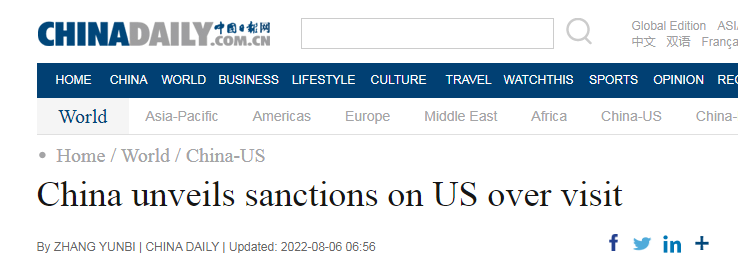LATEST INSIGHTS
Your Present Location: LATEST INSIGHTSWang Wen: China unveils sanctions on US over visit
Source: CD Published: 2022-08-06

Defense, justice, climate change among areas included in Beijing's latest moves
Beijing announced on Friday its decision to take eight countermeasures in response to Speaker of the US House of Representatives Nancy Pelosi's visit to Taiwan, covering areas of bilateral collaboration such as defense, justice and climate change.
According to the list of countermeasures issued by the Foreign Ministry, China decided to cancel three cooperative dialogues or meetings between the two nations' defense authorities or militaries.
In addition, Beijing suspended two-way judicial cooperation in areas such as illegal immigrants, cross-border crimes and narcotics, as well as bilateral consultation on climate change.
On Friday, China also announced its decision to impose sanctions against Pelosi and her immediate family members in accordance with relevant laws of China, in response to Pelosi's provocative moves.
In disregard of China's serious concern and firm opposition, Pelosi insisted on visiting Taiwan, which "constitutes gross interference in China's internal affairs, gravely undermines China's sovereignty and territorial integrity, seriously tramples on the one-China principle, and severely threatens peace and stability across the Taiwan Straits", an unnamed Foreign Ministry spokesperson said in a statement.
On Thursday, US National Security Council Coordinator for Strategic Communications John Kirby and US Secretary of State Antony Blinken accused China of pushing to change the status quo.
The current situation was "entirely prompted" by Pelosi and US politicians, Foreign Ministry spokeswoman Hua Chunying said at a news conference on Friday. "The US is the initiator of this crisis", and it has disregarded warnings sent by China and the rest of the international community prior to Pelosi's visit, she added.
Su Hao, a professor of international relations at China Foreign Affairs University, said that what lay behind Washington accusing Beijing of changing the status quo is its hypocrisy and its actions that betrayed its commitments on the Taiwan question and on improving China-US relations.
"In their recent talks with the Chinese side, both US President Joe Biden and Secretary of State Antony Blinken reiterated that the US does not support 'Taiwan independence'. However, it was Pelosi's visit to Taiwan that stirred up tensions in the Taiwan Straits," he said.
As for Washington, it is sheer bullying for it to do whatever it wants at the cost of the region's stability and a country's sovereignty and security just to secure US hegemony, he added.
Su Xiaohui, deputy director of the China Institute of International Studies' Department of American Studies, noted that there have been some dangerous shifts in Washington's attitude recently toward the Taiwan question-from stressing that there is no change in its one-China policy toward a position that says Beijing should be responsible for the situation's escalation.
"Sovereignty and territorial integrity are indispensable parts of a country's core national interests. Washington knows crystal clear that Pelosi's visit was against the one-China principle, but it refused to correct the mistake, and even worse, it tried to shift all of the blame to China," she said.
Observers said it is unlikely that Washington will move away from seeking competition-and sometimes risking confrontation-with Beijing in the long run.
Some US senators are reportedly pushing to pass an act that will bolster Taiwan's "international presence" and further infuriate Beijing.
Zhu Feng, executive dean of the School of International Relations at Nanjing University, warned that "some political figures in the US dare to incite and give rise to confrontations and conflicts in the region just for their own self-interest".
"There may be more cases of confrontation or conflict between China and US in the long run. In response, China should shore up its strategic courage, vision and wisdom, and make full preparations for that," he said.
Pelosi's visit to Taiwan is another example of the hypocritical and two-faced nature of Washington's China policy, he added.
Wang Wen, executive dean of the Chongyang Institute for Financial Studies of Renmin University of China, said the two countries may witness further friction and struggles over a number of issues.
"While China has been working hard to steer the relationship away from the Thucydides trap, the US is irresponsibly pushing the two countries into the pitfall of confrontations as it seeks greater strategic interests," he said.
Countermeasures in response to Nancy Pelosi's visit to Taiwan
1. Canceling China-US Theater Commanders Talk.
2. Canceling China-US Defense Policy Coordination Talks (DPCT).
3. Canceling China-US Military Maritime Consultative Agreement (MMCA) meetings.
4. Suspending China-US cooperation on the repatriation of illegal immigrants.
5. Suspending China-US cooperation on legal assistance in criminal matters.
6. Suspending China-US cooperation against transnational crimes.
7. Suspending China-US counternarcotics cooperation.
8. Suspending China-US talks on climate change.
Key Words: China,US,Taiwan,Wang Wen























































































 京公网安备 11010802037854号
京公网安备 11010802037854号





